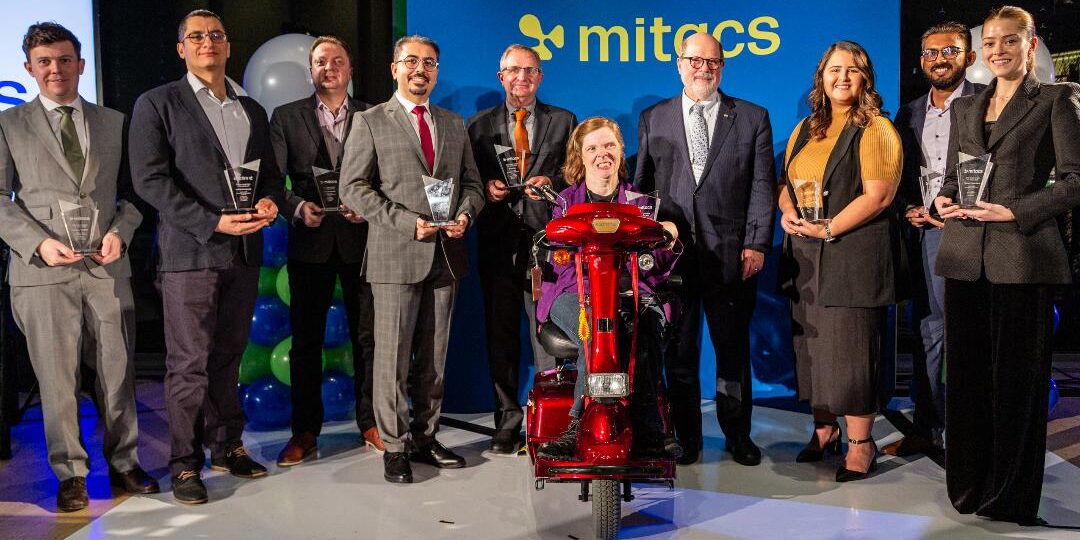Nine Canadian innovators were recognized for groundbreaking research spanning the gamut from clothing that monitors blood-glucose levels, to creating inclusive spaces for Indigenous youth, to removing employment barriers for Canadians with communication disabilities.
“Mitacs is honoured to play a pivotal role in empowering industry leaders across Canada to foster game-changing ideas, and we couldn’t be more pleased to celebrate their significant achievements with these awards,” John Hepburn, Mitacs CEO said in a released statement.
Winner of the Mitacs Award for Outstanding Innovation – PhD was awarded to Reza Eslami, CEO of Sensofine. Eslami created a first-of-its-kind smart garment that measures blood sugar levels through sweat, a non-invasively collectable source of biomarkers.
The garment uses sensors and a body-adapted self-powered system that recharges through everyday movements like walking.
This monitoring offers a precise, continuous and pain-free alternative to finger prick tests or arm-mounted blood monitoring devices that appeals to children, pregnant women and elders.
The first iteration of these garments is expected to be available by 2025.
Mitacs Award for Outstanding Innovation – Postdoctoral winner was Ketul Patel, a postdoctoral researcher in the Faculty of Science at the University of Calgary.
Patel helped discover a small molecule that targets a newly discovered pathway for pain relief that effectively mitigates pain without the detrimental side effects of opioids.
Collaborating with Calgary-based Zymedyne Therapeutics is leading to the development of new drugs that will utilize T-Type calcium channels.
This breakthrough in pain management is expected to help solve the growing opioid crisis by delivering safer, more effective and non-addictive pain medications in the near future.
Hannah Fronenberg received the Mitacs Award for Outstanding Innovation – International. The McGill University PhD researcher in physics recently completed a Mitacs internship at New York University where her work to uncover new information about the origins of the universe pushed the frontiers of current knowledge.
Fronenberg is the first researcher to measure fossil sound waves embossed in the universe in order to find out more about the formation of stars, galaxies and planets immediately following the big bang. Her radical work is paving the way for new astronomical discoveries.
Glenda Watson Hyatt, a Master’s researcher in the department of applied science at Queen’s University, earned the Mitacs Award for Outstanding Innovation—Master’s for her disruptive efforts to remove employment barriers facing Canadians living with communication disabilities.
The unemployment rate for people living with communications disabilities is as high as 86 per cent, compared to 21 per cent for Canadians without disabilities.
Watson Hyatt, who lives with speech disabilities, conducted a groundbreaking study focusing on workplace accommodation. Her research showed that while employers accommodate for hearing and sight loss, greater efforts need to be made in accommodating people relying on augmentative and alternative communication.
The Mitacs Award for Inclusive Innovation was earned by Kristy Choquette, a PhD student in the School and Clinical Child Psychology program at the University of Alberta.
Choquette’s groundbreaking work to ensure Indigenous youth are represented when evaluating the mentoring programs and supports in place to help them transfer out of child welfare services as they age out.
Brian Klein and Georges Kaddoum each earned the prestigious Mitacs Award for Exceptional Leadership.
Klein earned his award for his ongoing work to foster collaboration and develop pioneering technologies in Canada’s mining sector.
The mineral process engineer and professor in the Norman B. Keevil Institute of Mining Engineering at the University of British Columbia, developed intelligent excavating shovels capable of sensing the quality of materials being mined in real time. Klein also advanced ore crushing methods that reduce energy use by 50 per cent.
Georges Kaddoum, research director of the Resilient Machine Learning Institute (ReMI) at École de technologie supérieure (ETS), received his award for his continued efforts to build an innovative hub that will support Canada’s next-generation wireless networks.
His cutting-edge 6G technology breakthroughs make it possible to deliver extremely fast and intelligent telecommunication networks that self-heal, self-optimize and self-configure.
This transformative work is not only critical for supporting tactical wireless networks relied on by Canadian emergency, military and humanitarian relief teams, but also the digital infrastructure that Canadians, businesses and governments rely on daily.
Matthew Mitchell, a postdoctoral researcher in the Stewart Blusson Quantum Matter Institute at the University of British Columbia, received the Mitacs Award for Commercialization.
Mitchell’s work in advancing a new era in microchips resulted in a unique method for 3D printing optical structures called wave guides. This makes it possible to reliably and efficiently connect photonic chips to other components, opening up new possibilities for quantum computing, faster and smarter wearable devices, and self-driving vehicles.
Global consumer packaged goods giant Unilever Canada was given the Mitacs Award for Exceptional Leadership—Industry for its pioneering work applying artificial intelligence (AI) to precision marketing, demand forecasting and promotional planning.
Over the course of its 25-year history, Mitacs has made it possible for exceptional research and development talent to collaborate with government and businesses to develop life-changing innovations.
With over 17,448 current and past projects, Mitacs is injecting renewed life into Canada’s lagging global innovation performance. Graduate and post-graduate students chosen for paid internships work on inter-disciplinary projects that give them meaningful work experience that makes transitioning into the workforce easier.
Mitacs is a non-profit organization supported by the Government of Canada, all ten provincial governments and the Government of Yukon.



